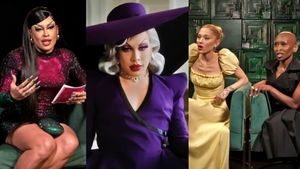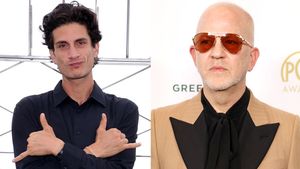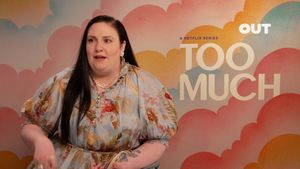Earlier this year, British singer Jessie J, in a stunning display of tweeting without thinking, made a series of remarks retracting her bisexuality. Having started her career when she was in a relationship with another woman, she has since concluded that she's only interested in men, but her tweets left much to be desired in terms of good taste. In keeping with a pair of new songs -- "Said Too Much" and "Personal" -- she has apparently decided to not speak on sexuality in the future.
In response to questions about her comments and tweets regarding her sexuality, she says, "I'm a talker; I wear my heart on my sleeve. But sometimes I just have to know when to shut up."
On the one hand, good for her on knowing when to stop talking. No one should ever have to explain themselves; no one owes anyone else their truth. On the other hand, it would be great if she apologized for owning other people's truth.
It's understandable that someone in the public eye might be wary of making a more clear declaration about something as private as sexuality and relationships. Those are the very things that get poked and prodded most in celebrity gossip.
It also makes sense in light of how difficult it is for many people to understand sexualities that aren't easily boxed, categorized, and labeled with "gay" or "straight." More than one well-known person previously identifying as gay or bisexual has been accused of returning to the closet, being ambiguous, or outright lying about identifying as straight. It's hard to know whether this is what they genuinely feel to be true of themselves or if it's a reaction to the constant stream of ignorance and backlash.
The problem isn't so much in the objection to being pinned down to an identity or even in someone coming to terms with their sense of self, even if it's not what we were expecting or hoping for. It's in how a person reflects on their past, present, and future relationships. Refusing to choose a label is one thing; doing so in a manner that throws other people under the bus is something else entirely.
Regardless of how she identifies, Jessie J erred on the side of using problematic language to discuss her sexuality. She referred to her relationship with another woman early in her career as a "phase." This is a troubling assessment that plays right into the idea that bisexuality is a passing whim for some and a stepping stone for others.
There's overt harm to bisexual people in such language, of course. For the vast majority of bisexuals, it's not a phase or a whim or a stepping stone to anything other than being open about who we are. The more phrases like that get thrown around, the more we have to justify ourselves to gay and straight people alike.
However, the classification of an entire relationship -- not a one-night stand or a casual hookup or messing around with a friend -- as a "phase" carries another, more subtle, dismissal. It undermines the very real pain of gay and lesbian people (and their partners) who enter into opposite-sex relationships because they cannot be or express who they are. For those people, it's not a brief, fun period of time, excused by the wild excesses of youth and tossed out off-handedly to fan followers on the Internet.
Jessie J explained herself thus: "Remember the thing that you tried/did back in the day. The phase you had? That is so not YOU anymore?! And you look back and think wow how I've changed. I would never do that now. Something that you don't even talk about or want to talk about anymore. Because you've moved on? That was just part of you growing up? Discovering yourself and working out what you liked and disliked. ... Remember?"
She's right that many of us look back on our lives and realize we've changed or that we would never make those choices again. Some of us don't want to talk about the time when we hid a vital part of ourselves, entering into relationships that fostered our denial and reinforced our feelings of shame about our identities. We don't want to lay bare the raw wounds of trying to make it work wearing an identity that didn't fit or with a partner who couldn't understand who we are. Flippant words about "phases" and moving on do nothing to heal that pain.
There isn't anything wrong with discovering who we are. But we need to take care that our language reflects our journey rather than dismissing the experiences and identities of others. It would help, too, if interviews weren't conducted in such a manner that people feel backed into a corner and respond the way they think they're expected to -- regardless of the direction the push comes from.
If a given public figure doesn't want to be the Official Spokesperson for [insert sexual and/or gender identity], that's absolutely 100 percent fine. In that case, rather than relying on harmful stereotypes and dismissive comments as a means of throwing off the press, Jessie J now has the right idea -- sealed lips. Here's a phrase to learn: "I prefer not to discuss my private life and my relationships." Lather, rinse, repeat as necessary.
AMY M. LEIBOWITZ is an author, spouse, parent, feminist, and book-lover falling somewhere on the Geek-Nerd Spectrum. In between noveling and editing, she blogs coffee-fueled, quirky commentary on faith, culture, writing, and her family.













































































